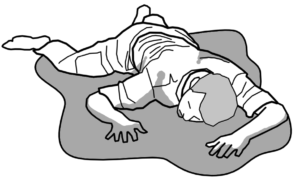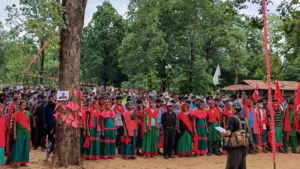Davao Oriental mining brings disasters and dislocation

Decades upon decades of operations by Pujada Nickel Project in Banaybanay City in Davao Oriental have caused disasters and widespread dislocation. This project brings profits to the local government and agencies, and is violently defended by the military and police despite the clear ill-effects of mining in the area.
Last January, the once clear waters of Mapagba and Pintatag rivers in Banaybanay turned orange due to siltation brought about by Riverbend Consolidated Mining Corporation-Arc Nickel Resources’ operations. The Department of Environment and Natural Resources (DENR) ordered the suspension of the company but was allowed to resume operations after two months.
The original mining concession in the area was granted in 2004 to Austral Asia Link Mining Corporation and Hallmark Mining Corporation, both controlled by Asiaticus Management Corporation (Amcor). In partnership with Amcor is BHP Billiton, an Australian-based company, known to be the world’s largest mining company. It pretends to be an advocate “responsible mining.”
The concession covers 17,000 hectares at the center of and adjacent to two declared protected areas—the Mt. Hamiguitan Wildlife Range and Pujada Bay Protected Seascape and Landscape. Mt. Hamiguitan is home to some endangered wildlife like the Philippine Eagle. Meanwhile, dugongs are frequently sighted in the Pujada Bay. In 2016, the former DENR secretary ordered the suspension of the whole project and said the permit granted by the agency was “insane.” Rodrigo Duterte lifted the suspension in 2019, allowing it to operate anew.
Davao Oriental’s local government led by its governor alleges that the mine is outside both protected areas. Nonetheless, mining affects the quality of water, air, biodiversity, resources and surrounding communities. According to a research, open-pit mining causes pollution beyond the area covered by the operation. Satellite images reveal the denudation of Mt. Hamiguitan and the total destruction of land formations in the watershed.
Since the mine is adjacent to Pujada Bay, its mine tailings are highly likely to flow towards and cause destruction to coral reefs. Chemical wastes will also pull down the quality of water which will kill fishes and other marine life and plants.
From the outset, residents, the church and environmental groups have vehemently opposed the mining operation. This year, the Mati people’s opposition was revitalized after Amcor’s reopening was announced. As a result, company officials attempted to bribe Mati Bishop Abel Apigo last July 27 for the church to withdraw its opposition to the destructive mining.
“Decades upon decades of mining accompanied by logging operations in Davao Oriental have denuded the forests, poisoned the rivers, and destroyed peasant and Lumad communities and their livelihood,” said the National Democratic Front-Southern Mindanao Region (NDF-SMR). The masses know the effects of mining all too well, especially during heavy rains and typhoons. Earlier this year, residents were beset by typhoons and heavy rains, landslides and alarming cases of diarrhea. “These were compounded by the reactionary regime’s failed disaster response,” it said.
Contrary to what mining companies boast, the Free, Prior, and Informed Consent it acquired from the native Mandaya community in the area is worthless. It was given by a fake council of elders which the company put up and is not recognized by majority of the Mandayas.
Permitting and justifying the mine’s continuous operations is stupid and irresponsible, said the NDF-SMR of the officials of the local and national government. In practice, only the revolutionary movement, through the New People’s Army, has been consistent in punishing these destructive companies.




